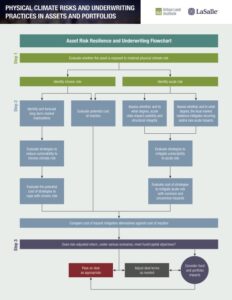Top Story
ULI Europe launches PropTech Innovation Challenge 2024
Competition is calling for innovative solutions to reduce carbon emissions in the built environment
April 11, 2024
London (April 11, 2024) – A new global report from the Urban Land Institute (ULI) and LaSalle Investment Management (LaSalle), a leading real estate investment management firm, offers a new framework to help the real estate industry act on climate risk disclosure data. Across the real estate industry, practitioners understand physical climate risk to assets and portfolios poses a financial risk, but there are still many challenges to enacting on the data being collected and disclosed.
This new framework is the latest tool for real estate investors and other practitioners to evaluate the costs of action and inaction when it comes to investing in resilience. The report, Physical Climate Risks and Underwriting Practices in Assets and Portfolios, is the second in a series by ULI and LaSalle. Building on the first report that outlined how to source and interpret reliable climate risk data, the second provides a market overview, adaptable framework, and recommendations based on emerging best practices for incorporating physical climate risk in the underwriting process.

“Physical climate risk data collection and disclosure is the first step the real estate industry can take to further invest in and build resilient infrastructure,” said Lindsay Brugger, head of Urban Resilience at ULI. “Data drives action, and doing nothing incurs deeper costs — from higher insurance premiums to asset repair or replacement. Focusing on the underwriting process, the framework offers investment managers a methodology for developing risk-adjusted returns so deals can be adapted in alignment with a firm’s fund or portfolio objectives.”
“This report helps provide guidance that investment managers can follow to factor the climate risk data they have available to them and improve outcomes at the asset and portfolio level,” said Julie Manning, Global Head of Climate and Carbon at LaSalle Investment Management. “We want to lead the conversation across the industry and collaborating with ULI is a great conduit to amplify the discussion that will ultimately benefit investors of all kinds with more resilient real estate portfolios.”
“In Europe, there is certainly increasing recognition of both physical and especially transitional risks that climate change poses to the built environment,” said Simon Chinn, Vice President, Research & Advisory Services, ULI Europe. “However, as this report suggests, concerns regarding physical risk arising from weather and climate related extremes may be perceived as a lower priority in Europe, compared to the US and Asia, which have to date experienced a greater frequency and intensity of hazard events, particularly hurricanes and wildfires. However, perceptions of physical risk on the Continent are beginning to change, particularly as the latest data from the European Environment Agency revealed that 2021 and 2022 combined yielded EUR 111.7 billion of damage across the EU, a 40-year high. Proactive, data-driven strategies to take action and mitigate risk in future will be essential, and this new framework provides an invaluable roadmap to navigate this complex area.”
The framework is broken down into three steps for decision making based on individual asset risks, local market risks, and ongoing risk mitigation efforts:
Evaluate the level of exposure to physical climate risk and financial implications;
Identify hazard mitigation strategies and estimate associated costs; and
Determine risk-adjusted return and whether or not that return meets firm objectives

As climate impacts continue to influence real estate markets around the world, improving understanding of physical climate risk and adjusting pricing to reflect risk are growing imperatives. Firms can better navigate the complexities of physical climate risk and capitalise on emerging opportunities by leveraging this new report’s insights and guidance. Prioritising knowledge diffusion and empowering informed decision-making processes is key to effectively managing and mitigating incoming climate risks in the evolving real estate industry, whether at a community or individual building scale.
The full report and downloadable framework can be found on ULI’s Knowledge Finder.
REPORTERS AND EDITORS: For more information, please contact:
ULI
Tony Nokling
[email protected]
LaSalle
Drew McNeill
[email protected]
About the Urban Land Institute
The Urban Land Institute is a non-profit education and research institute supported by its members. Its mission is to shape the future of the built environment for transformative impact in communities worldwide. Established in 1936, the institute has more than 48,000 members worldwide representing all aspects of land use and development disciplines. For more information on ULI, please visit uli.org, or follow us on Twitter, Facebook, LinkedIn, and Instagram.
About LaSalle Investment Management
LaSalle Investment Management is one of the world’s leading real estate investment managers. On a global basis, LaSalle manages over $89 billion of assets in private and public real estate property and debt investments as of Q4 2023. LaSalle’s diverse client base includes public and private pension funds, insurance companies, governments, corporations, endowments and private individuals from across the globe. LaSalle sponsors a complete range of investment vehicles including separate accounts, open- and closed-end funds, public securities and entity-level investments. For more information please visit www.lasalle.com, and LinkedIn.
Don’t have an account? Sign up for a ULI guest account.